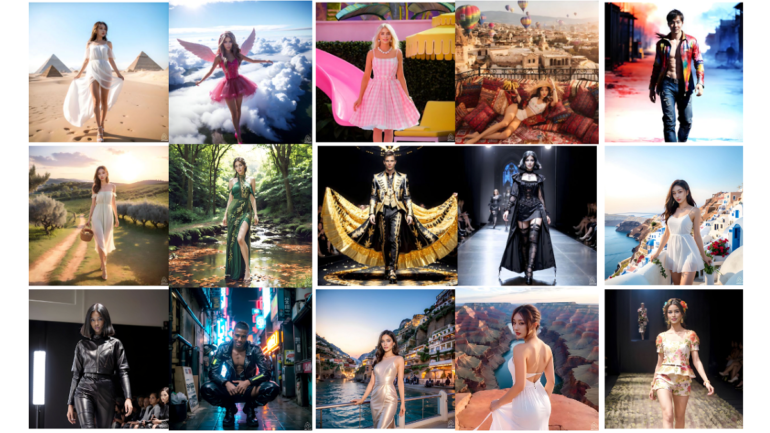TL;DR:
- Artisse introduces advanced AI photo creation, challenging Remini and others.
- Users upload 15 selfies to train AI for personalized image generation.
- Text or image prompts are used to create new AI photos with diverse styles.
- Artisse’s proprietary model combines open-source elements for realistic results.
- Focus on inclusivity: addressing body shapes and skin tones for authenticity.
- Founder William Wu aims to democratize perfect self-photography.
- App invests 30-40 minutes for AI training, yielding swift AI-generated images.
- User inspiration is available from diverse styles and poses in the gallery.
- Initial 25 images are free; later, a subscription model with added features.
- Consulting services offered for B2B clients, including model selection and post-production.
- Artisse’s potential expansion with discussions on funding and partnerships.
Main AI News:
In the ever-evolving landscape of AI-powered photo applications, Artisse emerges as a groundbreaking contender, poised to redefine the realm of self-portraiture. The app, challenging the likes of the recent viral sensation Remini and its counterparts, introduces an array of transformative features that empower users to create remarkably realistic AI-rendered images based on their personal snapshots. Artisse sets itself apart by not only embracing a broader spectrum of input possibilities but also by delivering unparalleled realism in the resulting compositions, even when venturing into the realm of fantasy.
Like its counterparts in the genre, Artisse prompts users to upload a sequence of fifteen self-portraits to facilitate the training of its AI algorithms. Upon completion of the upload, users can embark on a creative journey by employing either text-based prompts or images to generate fresh AI-rendered portraits. This dynamic functionality extends to the utilization of templates or self-provided reference photographs, enabling users to craft visuals of themselves in diverse scenarios, poses, and styles. When using templates, the option to customize images remains at your fingertips, with the ability to shift styles and incorporate supplementary prompts to refine the outcome.
Behind the scenes, Artisse leverages a proprietary model meticulously crafted by the company’s experts. This model is fortified by the infusion of proven methodologies and elements from existing open-source models and tools, underscoring Artisse’s commitment to excellence in technology and aesthetics.
Addressing a persistent challenge in the AI photo app landscape, Artisse is dedicated to enhancing inclusivity with respect to body shapes and skin tones. The app’s aspiration to transcend this hurdle is evident, aiming to avoid the pitfalls experienced by others in the industry. Notably, the app aims to avoid instances where users’ appearances are disproportionately altered, ensuring that personal authenticity is preserved.
Rooted in the vision of its founder, William Wu, Artisse emerged as a bootstrapped startup determined to democratize the pursuit of flawless self-representation. Wu, drawing on his experiences in investment and strategy roles at distinguished firms, recognized the prevalent trend of idealized self-images dominating social platforms like Instagram and dating profiles. He envisaged a future where crafting perfect self-portraits transcended privilege, patience, and skill, welcoming individuals of diverse backgrounds to partake in this transformative visual experience.
However, this ambitious journey towards personalized perfection demands time and dedication. Artisse distinguishes itself by investing approximately 30 to 40 minutes in processing and training its AI algorithms—a testament to its dedication to excellence. The resulting AI-generated images are realized in mere minutes, accentuating the app’s proficiency in delivering realistic outcomes.
In pursuit of its mission, Artisse also facilitates visual inspiration through an expansive gallery featuring both male and female subjects in diverse styles, poses, and settings. This curated collection provides a wellspring of ideas for users aiming to embark on their creative visual endeavors.
Artisse’s value proposition extends to its pricing model, striking a balance between accessibility and sustainability. The app initially offers users their first 25 AI-generated images free of charge, followed by a modest fee of around 20 cents per image. Notably, Artisse is poised to introduce a subscription model in its forthcoming release, encompassing high-definition options and advanced sizing capabilities. For businesses seeking to leverage Artisse’s capabilities, a comprehensive consulting-style service is also on offer, encompassing model selection, image generation, and post-production support.
Conceived under the aegis of Hong Kong-based Mumu Labs, Artisse represents a convergence of innovation and ingenuity. While currently operating as a bootstrapped entity, the startup is charting a path toward expansion and is actively engaged in discussions with potential investors and partners.
Available on both iOS and Android platforms, Artisse’s reach is set to extend to the vast user base of photo-editing applications, encompassing approximately 800 million individuals. Moreover, the company’s vision is poised to extend to the web, with plans to launch its web-based version in the near future.
Conclusion:
Artisse’s entrance into the market signifies a significant advancement in AI-driven photo applications. With its emphasis on customization, realism, and inclusivity, Artisse appeals to a diverse audience seeking personalized and authentic self-representation. The innovative technology and strategic pricing model position Artisse as a formidable competitor, poised to redefine the landscape of personal photography applications and cater to a wide range of user preferences.

